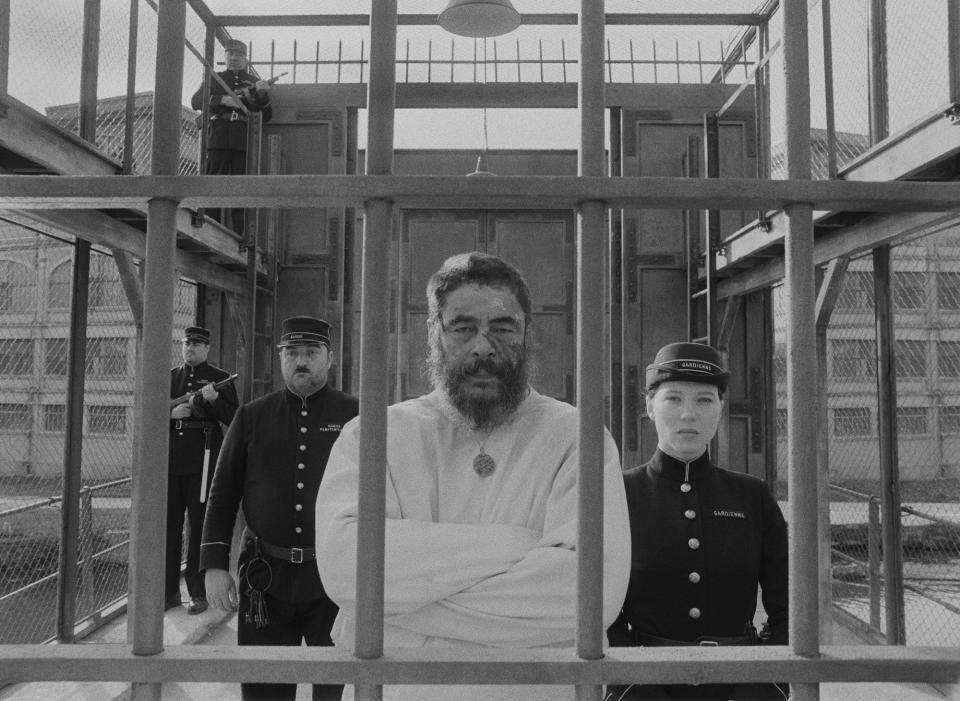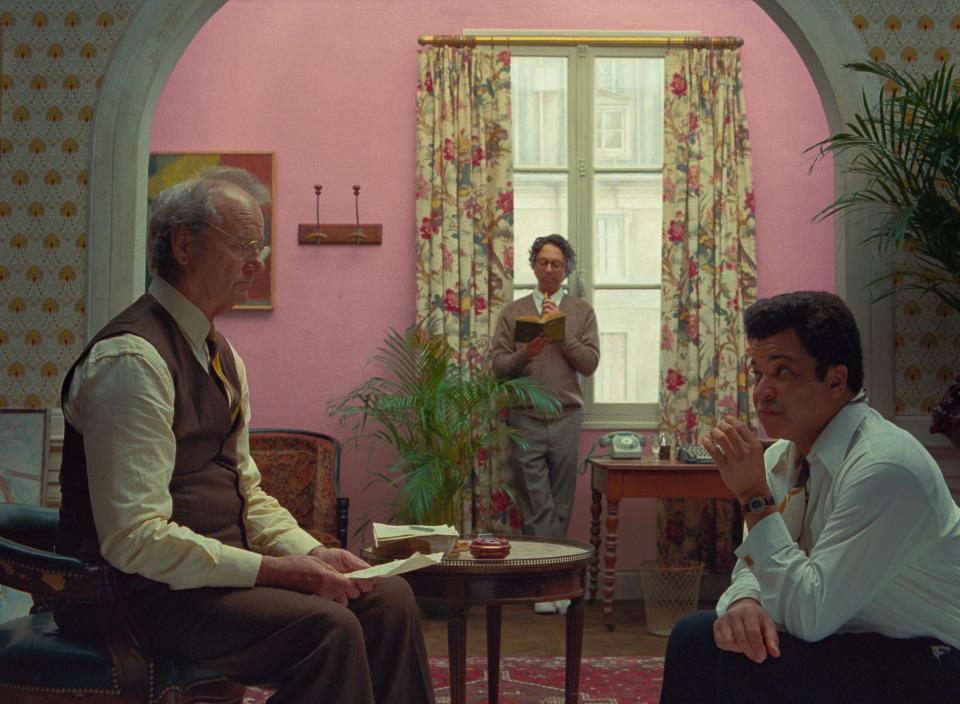Review: Wes Anderson's all-star 'The French Dispatch' inventively honors oddball journalism
Most journalists can’t relate to “All the President’s Men” – changing the world with our words and looking like Robert Redford while doing so. Our lives are more like that of the disparate oddballs in writer/director Wes Anderson’s new “The French Dispatch,” crafting stories that veer off on strange tangents, spotlighting colorful subjects and impossibly putting yet another issue to bed on deadline.
A love letter to both French cinema and international reportage, “French Dispatch” (★★★? out of four; rated R; in theaters Friday) finds Anderson marrying his signature style of filming – and an A-list bunch of his usual players – with a collection of short stories featuring murderous artists, student revolutionaries and one master of police cooking. Like most anthologies, some segments are better than others but they all highlight different inspirations Anderson’s woven together for a delightful cinematic sampler.
'I really hate seeing myself': Gwyneth Paltrow reveals the only movie she can watch herself in is a Wes Anderson work

It’s the final issue of the French Dispatch, a supplement of the Evening Sun newspaper in Liberty, Kansas, that for decades has brought the quirky residents and goings-on of Ennui-sur-Blasé home to American readers. But this last printing is also a tribute to its beloved editor and founder, Arthur Howitzer, Jr. (Bill Murray), found dead of a heart attack in his office though he plays an important role throughout the film.
Anderson inventively crafts his movie’s story structure like that of its title magazine, kicking off with cycling reporter Herbsaint Sazerac (Owen Wilson) taking readers on a travelogue of Ennui’s darker corners. (When Arthur wonders if the piece is maybe too seedy, Herbsaint argues that it’s “charming.”)

In the first (and best) of three “feature stories,” art critic J.K.L. Berensen (Tilda Swinton in full Barbara Walters mode) chronicles the saga of Moses Rosenthaler (Benicio del Toro), a criminally insane painter jailed after a violent night out who finds his unlikely muse in guard Simone (Léa Seydoux). Fellow convict – and art dealer – Julian Cadazio (Adrien Brody) is wowed by Moses' prison works and when he gets out, Julian helps make the painter a phenomenon in the art community, though Moses’ genius turns out to be maddeningly finicky.
Frances McDormand takes the lead in the next tale as political essayist Lucinda Krementz, who goes to the frontlines of a building conflict with college kids chafing against their conservative government based on a real-life May 1968 student uprising in Paris. ("What do they want? Freedom, full stop," Lucinda writes). Surrounded by kicky youngsters dancing like they were in a French New Wave flick, rebels Zeffirelli (Timothée Chalamet) and Juliette (Lyna Khoudri) are rivals as well as lovers, and when the first draft of Zeffirelli’s manifesto isn’t the best, he turns to Lucinda for edits as well as more intimate assignments.
Suspense is terrible': Timothée Chalamet reveals magical first look as young Willy Wonka

Lastly, Jeffrey Wright channels James Baldwin as the French Dispatch’s resident expat food writer Roebuck Wright in Anderson’s most action-packed and unexpectedly thoughtful chapter. Roebuck’s assigned a profile of Nescaffier (Stephen Park), personal chef of Ennui’s Commissaire (Mathieu Amalric), but then gets embroiled in the kidnapping of the Commissaire’s crime-solving son Gigi by the notorious Chauffeur (Edward Norton).
Del Toro, Seydoux, Wright and Park are the standouts of Anderson’s talented cast, which also includes Elisabeth Moss as a Dispatch copy editor, Jason Schwartzman as the cartoonist, Willem Dafoe as a criminal accountant and Saoirse Ronan as one of the Chauffeur's crew.

Murray doesn’t get a lot of screen time but he’s great appearing fitfully as the magazine’s tough-love editor (a “No crying” sign hangs in his office) whose deadpan demeanor belies the fact he cares deeply for his writers. As Arthur advises one, “Try to make it sound like you wrote it on purpose.”
If you don’t already dig Anderson’s vibe from works like “The Royal Tanenbaums” and “The Grand Budapest Hotel,” “French Dispatch” might be polarizing because all of the filmmaker's idiosyncrasies are on full display. And the film sometimes gets lost in them – for example, the digressive story-within-a-story that plays out in the McDormand/Chalamet combo. Mainly, though, it works as a fanciful, well-crafted reminder that journalism can be a weird but pretty cool job.
This article originally appeared on USA TODAY: 'The French Dispatch' review: Wes Anderson honors oddball journalists
Solve the daily Crossword

